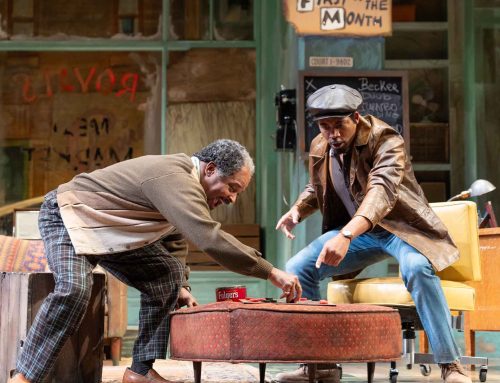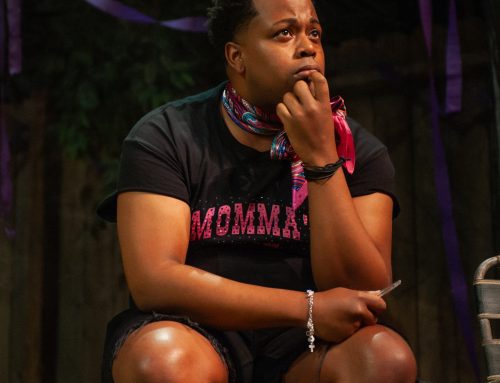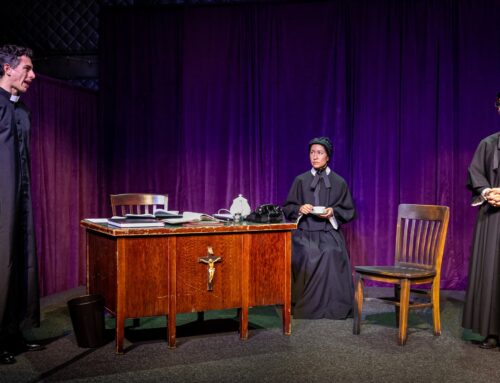
at the Oregon Shakespeare Festival
The Further Adventures of Hedda Gabler by Jeff Whitty
Ibsen’s play Hedda Gabler ends with the title character shooting herself. This play starts off with the last page of Ibsen’s dialog and cavorts forward from there. You don’t need to have seen or know the original Hedda, you’ll soon learn all you need to know about that classic.
Written by the 2004 Tony Award winner for Best Book of a Musical for Avenue Q, this Hedda fills the frothy farce slot in Oregon Shakespeare Festivals schedule. You know: the accessible funny play that everyone likes and you take your grandmother and culture-hating red-neck cousin to.
So, as I watched, I worried. It isn’t that TFAOHG isn’t funny. It is. In fact it is hilarious and brilliant and quick.
But, it isn’t pointless and accessible and safe. I expected tomatoes and rotten eggs and boos from the parts of the audience not ready for more than froth in their annual farce.
You see, after shooting herself in Ibsen’s story, our Hedda wakes up and tries to figure out what’s going on. In quick succession she meets Mammy and Medea before Tosca drops in on the household. It turns out that Hedda lives on the cul de sac of tragic women. She lives out her suicide over and over and over. She and her closest friends are the immortal successes with their tragedies, but the stage gets littered with characters who don’t last so long.
This time when Hedda wakes up, she decides she wants to change. She wants to be happy. And, our journey starts.
And, what a trip! Hedda is played by Robin Goodrin Nordli, the same actress who had the title role in OSF’s 2003 production of Ibsen’s play. That casting reflects the in-the-know Easter eggs which are planted throughout the script.
Hedda leaves home to talk her author into rewriting her as a happy person. Hedda’s husband Tesman (played by the always-jumping-on-a-sofa Chris DuVal) and Mammy (Kimberly Scott) follow. Along the way, the followers encounter a slew of fictional characters, some transient and some immortal like Hedda.
Patrick (Anthony Heald) and Steven (Jonathan Haugen) from The Boys in the Band join in as traveling companions. They bond quickly with Mammy because each of the three have been cast out by their own people. They’re viewed as sell outs or self-loathing anachronisms by today’s audiences.
But, it’s all good farce, remember? Certainly the quick bitch fights have happy zingers. And, who cannot like a cocktail party in a row boat when Mammy, Patrick, and Steven commiserate about their fate?
My worries about flying tomatoes became a panic as the travelers meet one fictional character after another and then bump into Jesus Christ. Actually 4 Jesuses: Jesus the Carpenter’s Son, Mel Gibson Jesus on the Cross, Baby Jesus, and Godspell Jesus. Carpenter’s Son explains that Mel Gibson Jesus and Baby Jesus are the most popular models because people like to focus on the birth and death and no so much about what he said. Or, something like that. It was all very quick, and it was hard to hear while I was under my seat, ducking to avoid what I was sure to be a very rotten tomato barrage.
Oddly, the audience kept laughing. Howling sometimes. Do all those older traditional grandmothers really understand the gay-infused allusions? Can they still like a play with those two explicatives bitch-screamed across the stage? (The photograph, by the way, shows Patrick and Steven in an unhappy moment… like the unhappy moment that ended all their parties.)
The staging (Christopher Acebo), flawless costumes (designed by Shigeru Yaji), and direction (Bill Rauch) complemented the spot-on acting ensemble. The many fictional characters were played by Kate Mulligan (Meda), Gregory Linington (Carpenter Jesus and others), and the other actors already complimented. It was a great, fast-moving zoo of personalities and witticisms.
We left the theater a bit dismissive. We were grinning about seeing something witty and fun, but we thought it was just fluff. But two days later I was still telling people about the play and how well the narrative exposed the importance of storytelling. At breakfast we discussed how we would have to update the characters for the audiences in 2058.
Finally we had to admit, TFAOHG got us thinking in addition to laughing.
Ozdachs Rating: ![]()





Leave A Comment